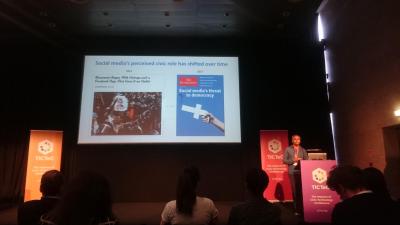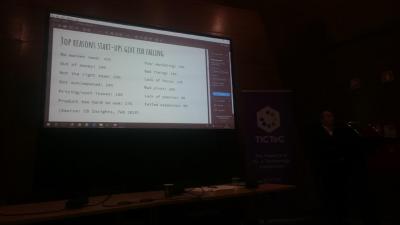TICTeC 2018 – An Introduction to the World of Civic Technologies
Posted on 17 July 2018
TICTeC 2018 – An Introduction to the World of Civic Technologies
 Image by Reka Solymosi
Image by Reka SolymosiBy Reka Solymosi, University of Manchester.
In April 2018, I was given the opportunity to explore the world of Civic Tech, through participating in TICTec2018, a conference for practitioners, commentators, academics, and funders of civic technologies.
First, for those who are not civic tech enthusiasts (I myself didn’t know much about it before attending this event), here’s a quick definition, listed from a MySociety blog article by Rubeena Mahato:
“Civic Tech is a rapidly growing field and covers a wide range of initiatives from open data groups to crowdsourcing and service delivery platforms and parliamentary monitoring websites.”
An example of Civic Tech is the online problem-reporting platform FixMyStreet. It was built by MySociety for mapping and reporting street problems to the councils responsible for fixing them anywhere in the UK, which makes it easier for citizens to engage with councils to solve their problems.
The conference featured some high-profile speakers, including Martha Lane Fox from Doteveryone, Micah Sifry of Civic Hall, Samidh Chakrabarti from Facebook, and John Webb from Google. For those interested in the full list of speakers, it can be found here, the slides for most talks are available on SlideShare and videos of sessions are also available on YouTube. I’ll just highlight some presentations that were most interesting for me.
MySociety’s Director of Research Rebecca Rumbul spoke about the need to distinguish between opinion and fact, and how it is important not to only generate knowledge but also acknowledge the limits of our abilities. She also announced MySociety’s new open data portal as part of her talk, which will grant access to some amazing insight into people’s engagement patterns with civic issues and should be of interest to many researchers.
Another talk that was interesting was Micah Sifry’s talk, which I appreciated for its focus not on the successes, but on the list of failures in civic technologies. Top reasons for failing included no market need, running out of money, and not having the right team, but there were even examples of a failed project with a history of securing $2,000,000 funding. It was interesting (and cautionary) to take this walk through the graveyard of failed civic tech applications.
 Image by Reka Solymosi
Image by Reka SolymosiFinally I’ll highlight the talk from Martha Lane Fox, talking about the changing relationship people are beginning to have with technology and the internet in light of recent scandals (e.g. Cambridge Analytica). She described these controversies as a lightning rod for the unease that citizens feel towards technology. Doteveryone did some research on the subject, and found that 50% of the people they interviewed said that technology helped them in their daily lives. So on the individual level people thought their lives were improved by tech. But on the collective level, only 12% felt that it was improving society. She argued that this reveals people’s anxieties about the macro-level impacts of technology, establishing a need for a systems change to make responsibility the “new normal” in tech.
The session in which I presented had a line up of people presenting research that makes use of that data generated by people’s participation in civic tech activities. Alex Parsons, at MySociety presented on work he’s been doing internally looking into FixMyStreet participation which also very nicely mirrored what I found in my work looking into this same data set. My presentation is available to view on YouTube with slides on SlideShare. The session generated much more discussion with others who had experience with these and similar data, which was a nice outcome.
Finally, the key takeaways from the conference for me came out of one of the discussion sessions around the role of research in civic tech. It was very valuable to sit at a table with non-academics who are interested in doing and consuming research. So here it is, in list form, the five things I learned about making research accessible and relevant to non-academic audiences from civic tech practitioners:
-
No more PDFs – try to move away from PDF as the preferred format for disseminating research
-
Video abstracts are great – think about creating one for your paper
-
Create Twitter-friendly content to share
-
Think about creating a project website with some engaging visuals
-
Practitioners will not seek out your work, they won’t carry out a thorough search. Instead they will ask around and read what they are recommended, what they can directly access.
Overall, it was a great experience to get outside of my comfort zone in terms of topic and audience and learn more about civic tech and the people who use, build, and research in this area, as well as experience so much passion and excitement around social change and using tech for good.

